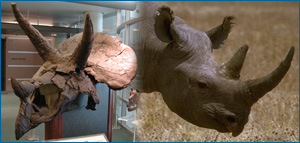
David’s work on mass extinctions deals with the past, but it has important implications for us today, particularly when it comes to conservation. We are currently facing what some biologists describe as the sixth mass extinction — only this is one of our own making. As humans change the face of the Earth through habitat destruction, consumption of natural resources, climate change, and pollution, we inevitably cause extinctions, but perhaps our impact needn’t be so large. David explains that “if we are going to develop policies on minimizing the large scale effects of present day extinctions and dislocations of species, clearly we should use the fossil record as one source of insight into possible mechanisms and consequences….There’s no question that if things go on, we are certainly going to get into that kind of [mass extinction-type] state, and the fossil record can give us cautionary tales about how the world works when ecologies are pushed past their breaking points.”
Though each mass extinction is certainly unique, David’s work highlights their regularities — for example, the fact that they all seem to spare widespread genera. “Realizing that mass extinctions are selective is a real step forward,” explains David. “Mass extinctions tend to preferentially remove spatially-restricted species, rather than the ones that are widespread, and that immediately gives us an idea about which lineages are most resistant to human activities…that they tend to be the rats, weeds, and cockroaches of the world, rather than the exquisitely adapted organisms that we often value highly.”
The fossil record also reveals how ecosystems recover from mass extinctions. For example, David points out that “after mass extinctions, there are often a lot of biological invasions…presumably because ecological opportunities are opened up to invaders after intense extinction has cleared the way….We don’t want to set up biological reserves and then have them subject to waves of undesirable invasive species….Understanding better how those biotic interchanges work should give some insight into how to control such invasions — or at least how to minimize their impact.”
Get tips for using research profiles, like this one, with your students.
